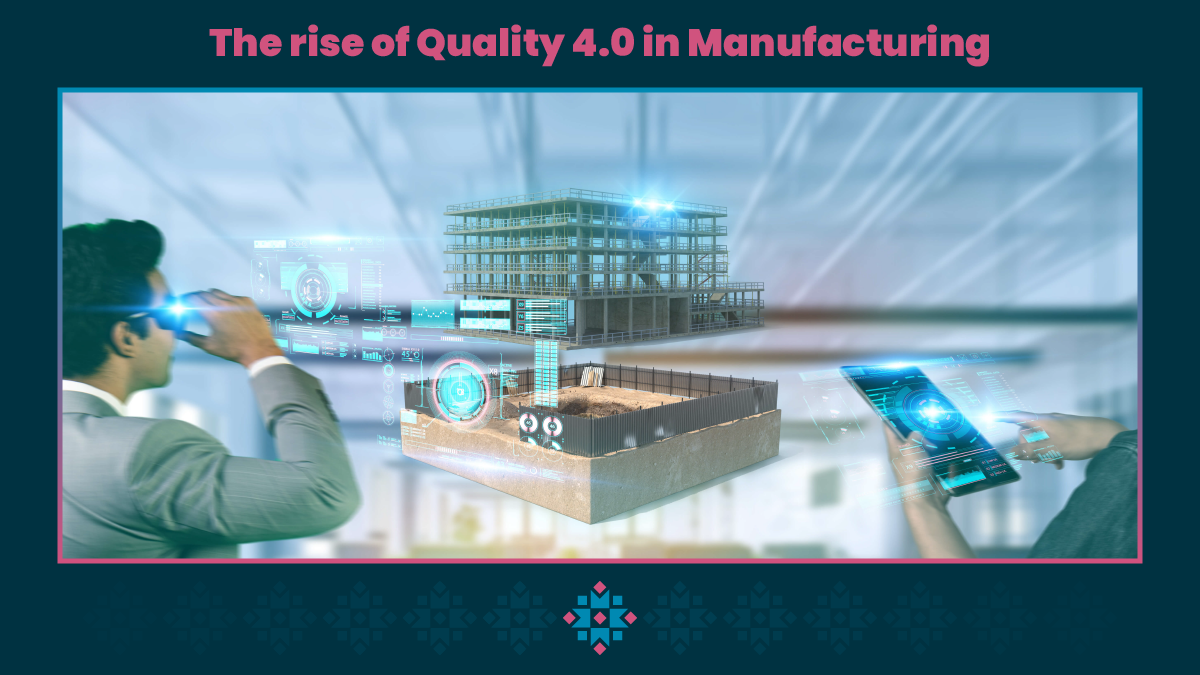The fourth industrial revolution, sometimes known as “Industry 4.0,” has emerged as a result of recent technological advancements. It’s a revolution fueled by the exponential expansion of disruptive technologies, as well as the changes they bring to the workplace, labor, and markets. In the context of Industry 4.0, the term “Quality 4.0” in Manufacturing refers to the future of quality and organizational excellence.
Quality 4.0: Principles and Implementation
It is critical that quality professionals assist their organizations in making the link between quality excellence and constant change. Utilizing quality concepts to facilitate transformation and growth is highly connected with three important factors – people, processes, and technology.
- Quality 4.0 in Manufacturing is more than just a technological advancement. It’s a new approach for quality professionals to manage quality using today’s digital tools and figuring out how to use them to achieve excellence via quality. They may upgrade their job from enforcers to navigators by successfully guiding enterprises through digital disruption and toward excellence.
- The necessity for faultless processes remains the same, if not more vital, as Industry 4.0 automate more and more activities. Existing procedures will be disrupted, necessitating the training of the next generation of workers to execute new processes and strategies. Quality is a critical link in the digital transformation process. Therefore, the strategic level should consider to ensure its long-term viability.
- Organizations’ platforms, such as processes, systems, data, operations, and governance, must keep up with technology, which is expanding ten times faster than it used to. Technology is also a leveler since it allows everyone with the appropriate concept and intent access to capabilities that were previously only available to giant corporations.
Technologies
Quality 4.0 technologies that apply in Industry 4.0 are Machine Learning (ML) and Artificial Intelligence (AI). These include text analysis, recommendation systems, email spam filters, fraud detection, forecasting, computer vision, language processing, and chatbots. Moreover, critical Quality 4.0 technologies are Mobile technology, Augmented Reality (AR), Virtual Reality (VR), and Cloud technologies. However, quality excellence requires a high level of mastery in data collection, which makes Big Data and Blockchain inseparable part of Quality 4.0.
Value Proposition
One advantage of Quality 4.0 is the improvement upon human intelligence which simultaneously results in speed and quality of decision-making being increased. The above-mentioned technologies would also improve transparency and traceability when implemented. Especially in industries with high complexity, specifics, and exceptions in processes and know-how systems that can support organizations with the knowledge reservation and transfer become critical.
In addition, Quality 4.0 offers a plethora of options for automating compliance. Today’s technology suppliers offer highly flexible, automated, and networked QMS systems, as well as validation automation tools. The concept of Quality 4.0 is strongly related to the way in which businesses would be able to predict outcomes, adapt to novelties, and embrace efficiency by increasing quality to excellence.
Strategies
In order for a business to harvest the fruits of Quality 4.0, business owners should build strategies accordingly.
- A Quality 4.0 plan is a great way to re-align quality with corporate goals. Many manufacturers have Big Data and Industry 4.0 strategic objectives, which frequently include quality enhancement use cases. Only 16% of the present market sees a clear and compelling link between quality and corporate strategy. This creates a great chance to both influence perceptions and redirect quality.
- When bad data automates procedures, one is likely to make a lot of bad decisions. Business owners should emphasize strategies connected to solid traditional quality foundations by setting clear goals.
- The Quality 4.0 approach enables businesses to address long-standing challenges, such as weak quality culture, a lack of data-driven choices, and insufficient cross-functional insights.
The future of Quality 4.0 in Manufacturing
The Fourth Industrial Revolution is taking place all around us. It expands the third revolution’s digital effect and integrates it with the physical and natural worlds. It creates new connections between people, machines, and data, democratizes technology previously only available to specialists. Thus, these technologies are critical for quality since they allow for changes in culture, leadership, collaboration, compliance, and strategic development.
We at Cosmos Thrace would love to assist you with innovation in your manufacturing business. Book a meeting, if you want to learn more. You can also check out our portfolio of services.


